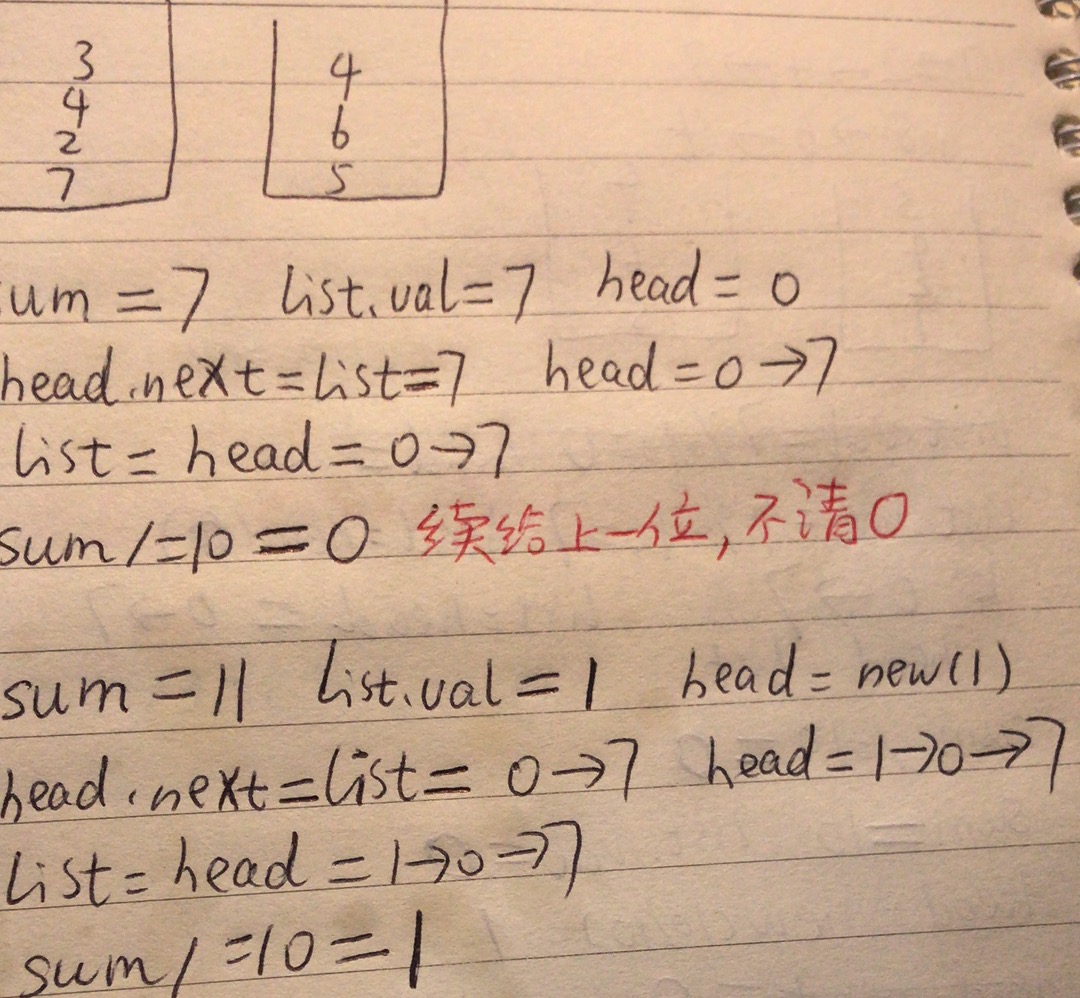[抄题]:
You are given two non-empty linked lists representing two non-negative integers. The most significant digit comes first and each of their nodes contain a single digit. Add the two numbers and return it as a linked list.
You may assume the two numbers do not contain any leading zero, except the number 0 itself.
Follow up:
What if you cannot modify the input lists? In other words, reversing the lists is not allowed.
Example:
Input: (7 -> 2 -> 4 -> 3) + (5 -> 6 -> 4) Output: 7 -> 8 -> 0 -> 7
[暴力解法]:
时间分析:
空间分析:
[优化后]:
时间分析:
空间分析:
[奇葩输出条件]:
[奇葩corner case]:
最后看第一位是不是0,不是0才能返回。
[思维问题]:
顺序是反的,不知道用stack
通过sum / 10的方法可以把十位取出来,不用清空,每次除10一直加就行了
[英文数据结构或算法,为什么不用别的数据结构或算法]:
[一句话思路]:
顺序是反的就要用stack求和
[输入量]:空: 正常情况:特大:特小:程序里处理到的特殊情况:异常情况(不合法不合理的输入):
[画图]:

[一刷]:
- 先初始化一个待添加列表list,然后余数都往后面加。求和的头都放在head中。
[二刷]:
- list.val = sum % 10; 可以直接往用等号list后面加点,不知道怎么来的
[三刷]:
[四刷]:
[五刷]:
[五分钟肉眼debug的结果]:
[总结]:
通过sum / 10的方法可以把十位取出来,不用清空,每次除10一直加就行了。倒序相加用stack
[复杂度]:Time complexity: O(n) Space complexity: O(n)
[算法思想:迭代/递归/分治/贪心]:
[关键模板化代码]:
[其他解法]:
[Follow Up]:
[LC给出的题目变变变]:
[代码风格] :
[是否头一次写此类driver funcion的代码] :
[潜台词] :

/** * Definition for singly-linked list. * public class ListNode { * int val; * ListNode next; * ListNode(int x) { val = x; } * } */ class Solution { public ListNode addTwoNumbers(ListNode l1, ListNode l2) { //initialization: 2 stacks Stack<Integer> stack1 = new Stack<Integer>(); Stack<Integer> stack2 = new Stack<Integer>(); //corner case if (l1 == null && l2 == null) return null; //put into stacks while (l1 != null) { stack1.add(l1.val); l1 = l1.next; } while (l2 != null) { stack2.add(l2.val); l2 = l2.next; } //while loop //get sum, val, head, append the previous val to head, give head to val, reset sum ListNode list = new ListNode(0); int sum = 0; while (!stack1.isEmpty() || !stack2.isEmpty()) { //get sum if (!stack1.isEmpty()) sum += stack1.pop(); if (!stack2.isEmpty()) sum += stack2.pop(); //get the val node list.val = sum % 10; ListNode head = new ListNode(sum / 10); //append the previous val to head, head is ready head.next = list; //give head to val list = head; sum /= 10; } //return return list.val == 0 ? list.next : list; } }
